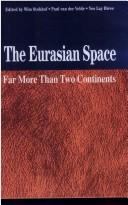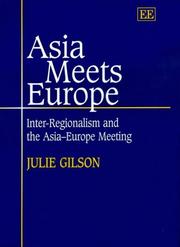| Listing 1 - 3 of 3 |
Sort by
|

ISBN: 9812305882 9812302638 9812302557 Year: 2004 Publisher: Singapore : Institute of Southeast Asian Studies,
Abstract | Keywords | Export | Availability | Bookmark
 Loading...
Loading...Choose an application
- Reference Manager
- EndNote
- RefWorks (Direct export to RefWorks)
The Asia-Europe Meeting (ASEM), officially established in 1996, is an inter-regional forum consisting of the 15 member states of the European Union and the European Commission, 7 member of the 10 states of ASEAN and China, Japan and South Korea. In this important volume academics from Asia and Europe examine the level of engagement between both continents and highlight how the ASEM process has been conducive in enhancing the political, economic and cultural ties between the various Asian and European countries. They address questions such as: how does the euro fit in the developing East Asian monetary cooperation; how does ASEM influence the process of East Asian identity building and what is the ASEM factor in the formulation of the new foreign policy of China? ASEM is wrongly a little known process because it plays a key role in formulating the emerging multilateralist world order of the 21st century.
POLITICAL SCIENCE / International Relations / General. --- Asia-Europe Meeting. --- ASEM --- ASEM Chŏngsang Hoeŭi --- Asian Europe Meeting --- Asia --- Europe --- Relations

ISBN: 1840641088 Year: 2002 Publisher: Cheltenham, UK ; Northampton, MA : Edward Elgar,
Abstract | Keywords | Export | Availability | Bookmark
 Loading...
Loading...Choose an application
- Reference Manager
- EndNote
- RefWorks (Direct export to RefWorks)
Regionalism --- Régionalisme --- Congresses. --- Congrès --- Asia --- Europe --- Asie --- Economic policy --- Politique économique --- -#SBIB:043.IOS --- #SBIB:327.1H20 --- #SBIB:33H071 --- -337.405 --- Human geography --- Nationalism --- Interregionalism --- Congresses --- Sociologie van de internationale betrekkingen: algemeen --- Economische internationale betrekkingen --- Asia-Europe Meeting. --- ASEM --- ASEM Chŏngsang Hoeŭi --- Asian Europe Meeting --- Council of Europe countries --- Eastern Hemisphere --- Eurasia --- Asian and Pacific Council countries --- -Congresses. --- Régionalisme --- Congrès --- Politique économique --- 337.405 --- #SBIB:043.IOS
Book
ISBN: 9814459623 981445950X Year: 2014 Publisher: Singapore : Institute of Southeast Asian Studies,
Abstract | Keywords | Export | Availability | Bookmark
 Loading...
Loading...Choose an application
- Reference Manager
- EndNote
- RefWorks (Direct export to RefWorks)
The inauguration of the Asia-Europe Meeting (ASEM) in Bangkok in 1996 was celebrated with enthusiasm and hopes in the two regions because this forum represented a breakthrough in Asia-Europe relations. The region-to-region pattern of the relations becomes the study framework that enables the explorations of central themes which include the Asian regional identity, ASEAN collective diplomatic prominence, and the informality of the ASEM institution. In exploring those central themes, this book applies constructivist, realist, and neo-liberal institutional theories consecutively. The difference between Asian and European cooperative culture, as well as the longevity of an international institution, adds to the picture. This book contributes not only to the study of Asia-Europe relations but also to the understanding of regionalism in Asia.
Electronic books. --- POLITICAL SCIENCE / International Relations / General. --- Books in machine-readable form --- Digital books --- E-books --- Ebooks --- Online books --- Books --- Electronic publications --- Asia --- Europe --- Council of Europe countries --- Eastern Hemisphere --- Eurasia --- Asian and Pacific Council countries --- Foreign relations --- Asia-Europe Meeting. --- ASEM --- ASEM Chŏngsang Hoeŭi --- Asian Europe Meeting --- Regionalism --- Regionalism. --- Human geography --- Nationalism --- Interregionalism --- Regionalism--Asia. --- Southeast Asia--Relations--Europe. --- Europe--Relations--Southeast Asia. --- Asia--Relations--Europe. --- Europe--Relations--Asia.
| Listing 1 - 3 of 3 |
Sort by
|

 Search
Search Feedback
Feedback About UniCat
About UniCat  Help
Help News
News